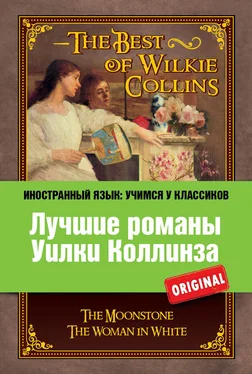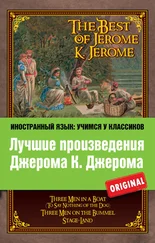“But you have an objection to make?”
“Yes. My objection is, that your proposal obliges us to wait.”
“Granted. As I reckon the time, it requires you to wait about a fortnight – more or less. Is that so very long?”
“It’s a life-time, Mr. Bruff, in such a situation as mine. My existence will be simply unendurable to me, unless I do something towards clearing my character at once.”
“Well, well, I understand that. Have you thought yet of what you can do?”
“I have thought of consulting Sergeant Cuff.”
“He has retired from the police. It’s useless to expect the Sergeant to help you.”
“I know where to find him; and I can but try.”
“Try,” said Mr. Bruff, after a moment’s consideration. “The case has assumed such an extraordinary aspect since Sergeant Cuff’s time, that you may revive his interest in the inquiry. Try, and let me hear the result. In the meanwhile,” he continued, rising, “if you make no discoveries between this, and the end of the month, am I free to try, on my side, what can be done by keeping a lookout at the bank?”
“Certainly,” I answered – ”unless I relieve you of all necessity for trying the experiment in the interval.”
Mr. Bruff smiled, and took up his hat.
“Tell Sergeant Cuff,” he rejoined, “that I say the discovery of the truth depends on the discovery of the person who pawned the Diamond. And let me hear what the Sergeant’s experience says to that.”
So we parted.
Early the next morning, I set forth for the little town of Dorking [101]– the place of Sergeant Cuff’s retirement, as indicated to me by Betteredge.
Inquiring at the hotel, I received the necessary directions for finding the Sergeant’s cottage. It was approached by a quiet bye-road, a little way out of the town, and it stood snugly in the middle of its own plot of garden ground, protected by a good brick wall at the back and the sides, and by a high quickset hedge in front. The gate, ornamented at the upper part by smartly-painted trellis-work, was locked. After ringing at the bell, I peered through the trellis-work, and saw the great Cuff’s favourite flower everywhere; blooming in his garden, clustering over his door, looking in at his windows. Far from the crimes and the mysteries of the great city, the illustrious thief-taker was placidly living out the last Sybarite [102]years of his life, smothered in roses!
A decent elderly woman opened the gate to me, and at once annihilated all the hopes I had built on securing the assistance of Sergeant Cuff. He had started, only the day before, on a journey to Ireland.
“Has he gone there on business?” I asked.
The woman smiled. “He has only one business now, sir,” she said; “and that’s roses. Some great man’s gardener in Ireland has found out something new in the growing of roses – and Mr. Cuff’s away to inquire into it.”
“Do you know when he will be back?”
“It’s quite uncertain, sir. Mr. Cuff said he should come back directly, or be away some time, just according as he found the new discovery worth nothing, or worth looking into. If you have any message to leave for him, I’ll take care, sir, that he gets it.”
I gave her my card, having first written on it in pencil: “I have something to say about the Moonstone. Let me hear from you as soon as you get back.” That done, there was nothing left but to submit to circumstances, and return to London.
In the irritable condition of my mind, at the time of which I am now writing, the abortive result of my journey to the Sergeant’s cottage simply aggravated the restless impulse in me to be doing something. On the day of my return from Dorking, I determined that the next morning should find me bent on a new effort at forcing my way, through all obstacles, from the darkness to the light.
What form was my next experiment to take?
If the excellent Betteredge had been present while I was considering that question, and if he had been let into the secret of my thoughts, he would, no doubt, have declared that the German side of me was, on this occasion, my uppermost side. To speak seriously, it is perhaps possible that my German training was in some degree responsible for the labyrinth of useless speculations in which I now involved myself. For the greater part of the night, I sat smoking, and building up theories, one more profoundly improbable than another. When I did get to sleep, my waking fancies pursued me in dreams. I rose the next morning, with Objective-Subjective and Subjective-Objective inextricably entangled together in my mind; and I began the day which was to witness my next effort at practical action of some kind, by doubting whether I had any sort of right (on purely philosophical grounds) to consider any sort of thing (the Diamond included) as existing at all.
How long I might have remained lost in the mist of my own metaphysics, if I had been left to extricate myself, it is impossible for me to say. As the event proved, accident came to my rescue, and happily delivered me. I happened to wear, that morning, the same coat which I had worn on the day of my interview with Rachel. Searching for something else in one of the pockets, I came upon a crumpled piece of paper, and, taking it out, found Betteredge’s forgotten letter in my hand.
It seemed hard on my good old friend to leave him without a reply. I went to my writing-table, and read his letter again.
A letter which has nothing of the slightest importance in it, is not always an easy letter to answer. Betteredge’s present effort at corresponding with me came within this category. Mr. Candy’s assistant, otherwise Ezra Jennings, had told his master that he had seen me; and Mr. Candy, in his turn, wanted to see me and say something to me, when I was next in the neighbourhood of Frizinghall. What was to be said in answer to that, which would be worth the paper it was written on? I sat idly drawing likenesses from memory of Mr. Candy’s remarkable-looking assistant, on the sheet of paper which I had vowed to dedicate to Betteredge – until it suddenly occurred to me that here was the irrepressible Ezra Jennings getting in my way again! I threw a dozen portraits, at least, of the man with the piebald hair (the hair in every case, remarkably like), into the waste-paper basket – and then and there, wrote my answer to Betteredge. It was a perfectly commonplace letter – but it had one excellent effect on me. The effort of writing a few sentences, in plain English, completely cleared my mind of the cloudy nonsense which had filled it since the previous day.
Devoting myself once more to the elucidation of the impenetrable puzzle which my own position presented to me, I now tried to meet the difficulty by investigating it from a plainly practical point of view. The events of the memorable night being still unintelligible to me, I looked a little farther back, and searched my memory of the earlier hours of the birthday for any incident which might prove of some assistance to me in finding the clue.
Had anything happened while Rachel and I were finishing the painted door? or, later, when I rode over to Frizinghall? or afterwards, when I went back with Godfrey Ablewhite and his sisters? or, later again, when I put the Moonstone into Rachel’s hands? or, later still, when the company came, and we all assembled round the dinner-table? My memory disposed of that string of questions readily enough, until I came to the last. Looking back at the social event of the birthday dinner, I found myself brought to a standstill at the outset of the inquiry. I was not even capable of accurately remembering the number of the guests who had sat at the same table with me.
To feel myself completely at fault here, and to conclude, thereupon, that the incidents of the dinner might especially repay the trouble of investigating them, formed parts of the same mental process, in my case. I believe other people, in a similar situation, would have reasoned as I did. When the pursuit of our own interests causes us to become objects of inquiry to ourselves, we are naturally suspicious of what we don’t know. Once in possession of the names of the persons who had been present at the dinner, I resolved – as a means of enriching the deficient resources of my own memory – to appeal to the memory of the rest of the guests; to write down all that they could recollect of the social events of the birthday; and to test the result, thus obtained, by the light of what had happened afterwards, when the company had left the house.
Читать дальше
Конец ознакомительного отрывка
Купить книгу












